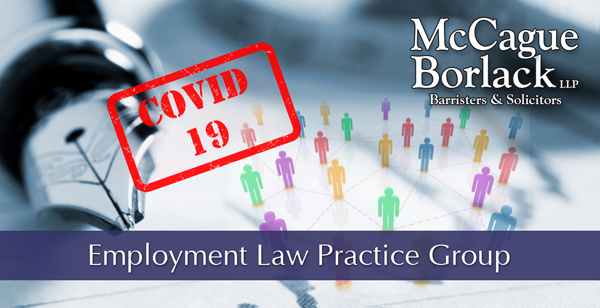
April 3, 2020
Canada's Emergency Wage Subsidy
in Response to COVID-19
The state of the law has been changing daily during the COVID-19 pandemic, and businesses and employers have been especially impacted by these changes.
After announcing the 75 per cent Canada Emergency Wage Subsidy on March 27, 2020, the Government of Canada announced new eligibility criteria for the Subsidy just days later. Specifically, on March 30, 2020, the Government set out that the Subsidy will be immediately available to non-profits, charities, and businesses of all sizes that have seen a reduction in revenue by at least 30 per cent as a result of COVID-19. Public sector entities are ineligible at this time.
The Subsidy will cover 75 per cent of the first $58,700 of each employee's salary, which is a maximum of $847 per employee, each week. The Subsidy will be back-dated to March 15, 2020.
Prime Minister Justin Trudeau warned that organizations that attempt to exploit or game this new system will face serious consequences. He encouraged organizations to make best efforts to pay the remaining 25 per cent of their employees' salaries, if they are able to do so, and to call back employees who have been laid off over the last few weeks.
Subsequently, on April 1, 2020, Finance Minister Bill Morneau held a teleconference to release details of the Subsidy. Following this teleconference, the Government of Canada announced in a News Release that the Subsidy would be available to qualifying businesses for up to three months, and would be in place for a 12-week period. The Subsidy would be available to eligible employers who suffer a drop in gross revenue of at least 30 per cent in March, April, or May when compared to the same month in 2019.
The News Release states that the measure is intended to support businesses "hardest hit" by the pandemic. Though the Subsidy appears on its face to be widely available, further consideration of the criterion requiring a reduction in revenue by at least 30 per cent suggests that the majority of businesses may not be eligible after all.
Specifically, most businesses did not sustain a 30 per cent reduction in revenue in March, and many will not see that level of reduction in April or May either. Rather, an entire quarter may pass before the impact of COVID-19 and the related government restrictions are reflected in business revenue.
Though the funds are retroactive, given that the program is only intended to be in place for 12 weeks, many businesses will not see a 30 per cent reduction in revenue within that timeframe, and will, therefore, be ineligible to collect entirely. As a result, many employers may find themselves in an unfortunate situation down that line, having kept employees on that they may have otherwise laid off or recalling employees that they otherwise would have left on temporary layoff, only to find out that they are ineligible to receive the Subsidy.
Certainly, the definition of "revenue" for the purpose of determining eligibility will be an important factor. At this time, no definition has been released. The Government is currently working with the non-profit and charities sector to ensure the definition of revenue established is appropriate to meet their needs. Therefore, it remains unclear whether "revenue" will include Work In Progress, or whether it will strictly encompass funds collected.
For those organizations that are not eligible for the Subsidy, the News Release confirmed that they may still qualify for the previously announced wage subsidy of 10 per cent of remuneration paid from March 18 to before June 20, up to a maximum subsidy of $1,375 per employee and $25,000 per employer. No minimum reduction in revenue has been announced as a bar to receiving this lower subsidy.
For now, the most reliable support may be the new improved access to business loans and credit at the lowered interest rate of 0.25, which are intended to help bridge business cash flow in these difficult times.
If you are considering if the foregoing applies to your business, please do not hesitate to reach out to me to answer any questions that you might have. We would be pleased to assist.
I hope that this finds you all well and keeping safe!
The chair of the employment law practice group, Martin Smith, can be reached at 613-566-5970 or msmith@mccagueborlack.com to answer any of your questions or put you in touch with a member of the firm's employment law practice group in either of our offices in Ottawa, Toronto, London, Kitchener, or Barrie.
TORONTO | OTTAWA | KITCHENER | BARRIE | LONDON
416.860.0001 | mccagueborlack.com | Follow us on Twitter or Linkedin
McCague Borlack LLP is a member of the Canadian Litigation Counsel,
a nationwide affiliation ofindependent law firms. Through CLC's association with
The Harmonie Group,
our clients have access to legal excellence
throughout North America, the U.K. and Europe.
clcnow.com | harmonie.org
|
